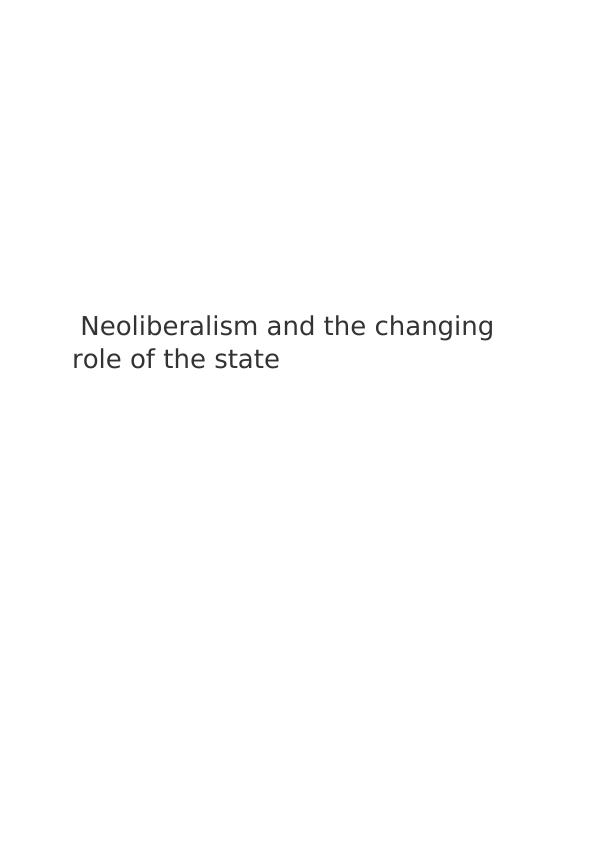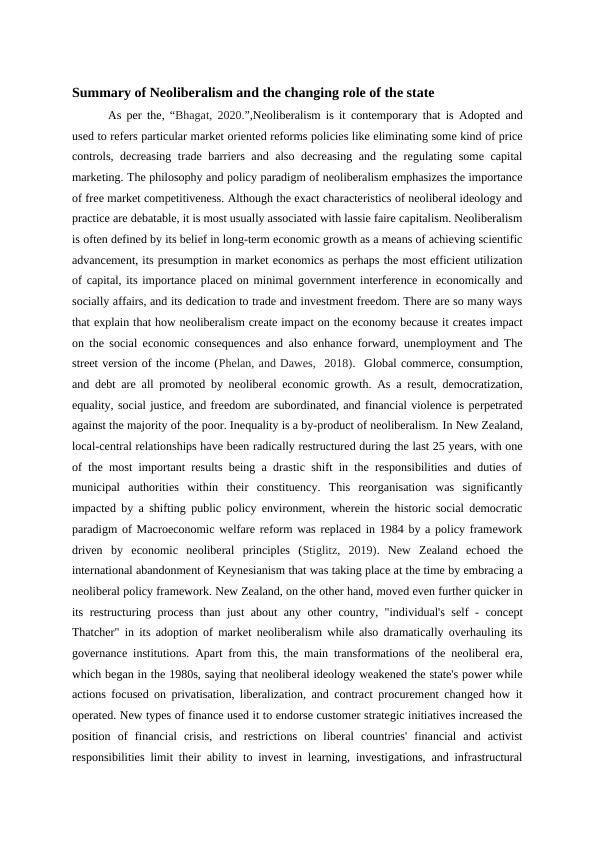Neoliberalism and the Changing Role of the State
Added on 2023-06-11
8 Pages2324 Words249 Views
Neoliberalism and the changing
role of the state
role of the state

Contents
Summary of Neoliberalism and the changing role of the state..................................................3
Summary of news articles..........................................................................................................4
Analysis of how the news articles related to the relevant academic literature...........................5
References..................................................................................................................................7
Summary of Neoliberalism and the changing role of the state..................................................3
Summary of news articles..........................................................................................................4
Analysis of how the news articles related to the relevant academic literature...........................5
References..................................................................................................................................7

Summary of Neoliberalism and the changing role of the state
As per the, “Bhagat, 2020.”,Neoliberalism is it contemporary that is Adopted and
used to refers particular market oriented reforms policies like eliminating some kind of price
controls, decreasing trade barriers and also decreasing and the regulating some capital
marketing. The philosophy and policy paradigm of neoliberalism emphasizes the importance
of free market competitiveness. Although the exact characteristics of neoliberal ideology and
practice are debatable, it is most usually associated with lassie faire capitalism. Neoliberalism
is often defined by its belief in long-term economic growth as a means of achieving scientific
advancement, its presumption in market economics as perhaps the most efficient utilization
of capital, its importance placed on minimal government interference in economically and
socially affairs, and its dedication to trade and investment freedom. There are so many ways
that explain that how neoliberalism create impact on the economy because it creates impact
on the social economic consequences and also enhance forward, unemployment and The
street version of the income (Phelan, and Dawes, 2018). Global commerce, consumption,
and debt are all promoted by neoliberal economic growth. As a result, democratization,
equality, social justice, and freedom are subordinated, and financial violence is perpetrated
against the majority of the poor. Inequality is a by-product of neoliberalism. In New Zealand,
local-central relationships have been radically restructured during the last 25 years, with one
of the most important results being a drastic shift in the responsibilities and duties of
municipal authorities within their constituency. This reorganisation was significantly
impacted by a shifting public policy environment, wherein the historic social democratic
paradigm of Macroeconomic welfare reform was replaced in 1984 by a policy framework
driven by economic neoliberal principles (Stiglitz, 2019). New Zealand echoed the
international abandonment of Keynesianism that was taking place at the time by embracing a
neoliberal policy framework. New Zealand, on the other hand, moved even further quicker in
its restructuring process than just about any other country, "individual's self - concept
Thatcher" in its adoption of market neoliberalism while also dramatically overhauling its
governance institutions. Apart from this, the main transformations of the neoliberal era,
which began in the 1980s, saying that neoliberal ideology weakened the state's power while
actions focused on privatisation, liberalization, and contract procurement changed how it
operated. New types of finance used it to endorse customer strategic initiatives increased the
position of financial crisis, and restrictions on liberal countries' financial and activist
responsibilities limit their ability to invest in learning, investigations, and infrastructural
As per the, “Bhagat, 2020.”,Neoliberalism is it contemporary that is Adopted and
used to refers particular market oriented reforms policies like eliminating some kind of price
controls, decreasing trade barriers and also decreasing and the regulating some capital
marketing. The philosophy and policy paradigm of neoliberalism emphasizes the importance
of free market competitiveness. Although the exact characteristics of neoliberal ideology and
practice are debatable, it is most usually associated with lassie faire capitalism. Neoliberalism
is often defined by its belief in long-term economic growth as a means of achieving scientific
advancement, its presumption in market economics as perhaps the most efficient utilization
of capital, its importance placed on minimal government interference in economically and
socially affairs, and its dedication to trade and investment freedom. There are so many ways
that explain that how neoliberalism create impact on the economy because it creates impact
on the social economic consequences and also enhance forward, unemployment and The
street version of the income (Phelan, and Dawes, 2018). Global commerce, consumption,
and debt are all promoted by neoliberal economic growth. As a result, democratization,
equality, social justice, and freedom are subordinated, and financial violence is perpetrated
against the majority of the poor. Inequality is a by-product of neoliberalism. In New Zealand,
local-central relationships have been radically restructured during the last 25 years, with one
of the most important results being a drastic shift in the responsibilities and duties of
municipal authorities within their constituency. This reorganisation was significantly
impacted by a shifting public policy environment, wherein the historic social democratic
paradigm of Macroeconomic welfare reform was replaced in 1984 by a policy framework
driven by economic neoliberal principles (Stiglitz, 2019). New Zealand echoed the
international abandonment of Keynesianism that was taking place at the time by embracing a
neoliberal policy framework. New Zealand, on the other hand, moved even further quicker in
its restructuring process than just about any other country, "individual's self - concept
Thatcher" in its adoption of market neoliberalism while also dramatically overhauling its
governance institutions. Apart from this, the main transformations of the neoliberal era,
which began in the 1980s, saying that neoliberal ideology weakened the state's power while
actions focused on privatisation, liberalization, and contract procurement changed how it
operated. New types of finance used it to endorse customer strategic initiatives increased the
position of financial crisis, and restrictions on liberal countries' financial and activist
responsibilities limit their ability to invest in learning, investigations, and infrastructural

End of preview
Want to access all the pages? Upload your documents or become a member.
Related Documents
Impact of Neoliberalism on UK Housing Policylg...
|10
|2603
|304
Neoliberalism and its impact on Democracy after 1990slg...
|8
|1703
|266
Assignment on Theory of Neo Liberalismlg...
|12
|3866
|73
Effectiveness of Critical Social Work Approach for Joy in the Context of Neoliberal Policieslg...
|8
|2286
|112
Tourism Management Neoliberalismlg...
|4
|1033
|11
Impact of Neoliberalism on Australian Employment Relationslg...
|12
|3276
|298
